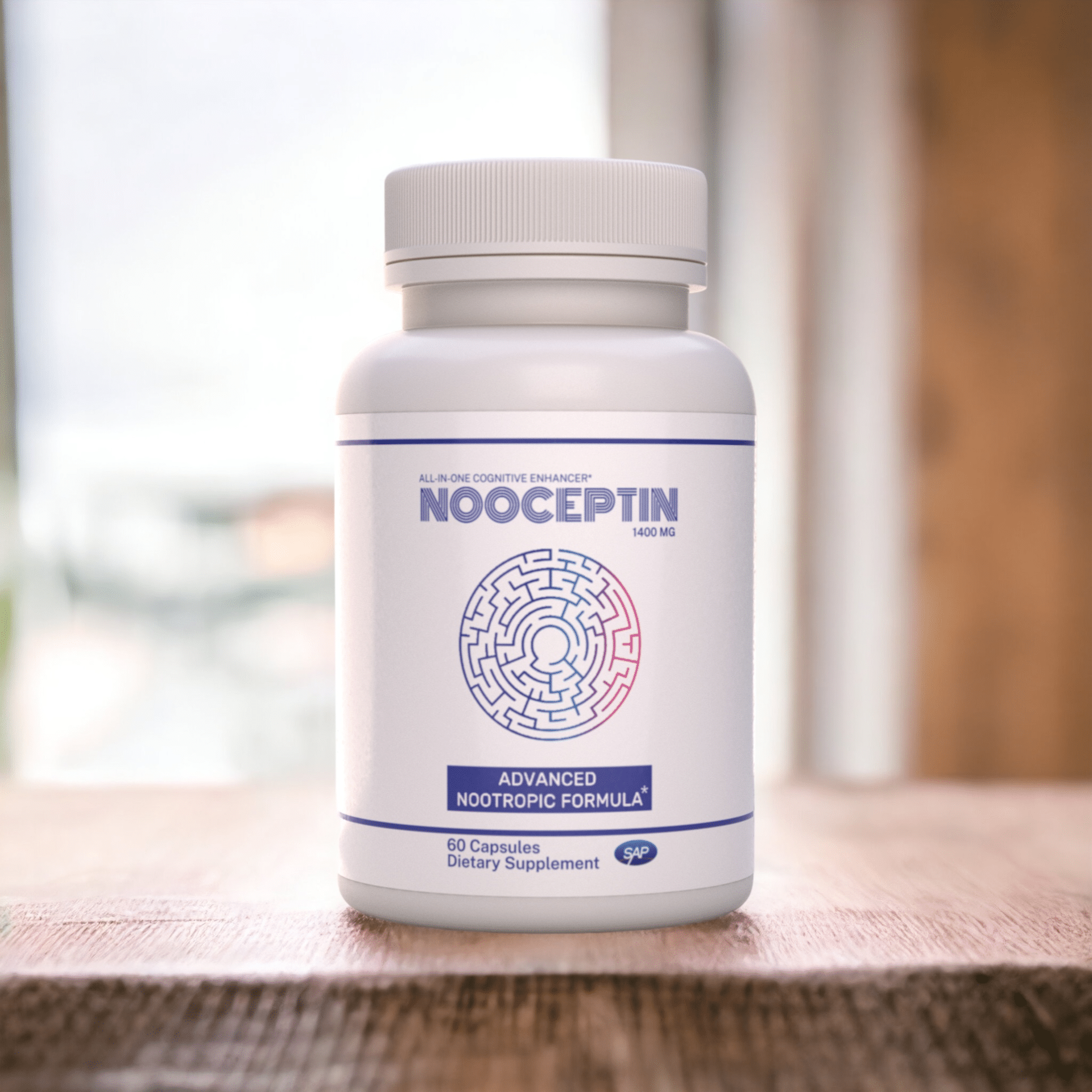Nooceptin vs Adderall: Key Differences and Benefits
July 19, 2023
In the rapidly expanding universe of nootropics a key question many people have is understanding the difference between Nooceptin and Adderall. We aim to unpack the complexities and highlight the unique characteristics that distinguish these two cognitive enhancers[1]. Our objective is to provide you with a comprehensive understanding, enabling you to make an informed decision tailored to your specific needs[2].

Overall Verdict
4.8 / 5 Stars
Benefits
Nooceptin is earning accolades for its comprehensive cognitive enhancement benefits. It is known to enhance memory, augment focus, and contribute to overall brain health[4]. On the other hand, Adderall, largely prescribed for attention deficit hyperactivity disorder (ADHD), has a proven track record for its concentration-boosting prowess[5].
Nooceptin has a key advantage when it comes to safety. Although Adderall exhibits robust potency as a stimulant, its side effects such as insomnia and an increased heart rate are noteworthy[6]. Conversely, Nooceptin, with its composition of natural compounds, presents a superior safety profile with less pronounced side effects[7].
Ingredients Comparison
When we look at the ingredient composition of these two cognitive enhancers, the distinction becomes more pronounced. Nooceptin leverages the potency of natural nootropics like Bacopa Monnieri, Alpha GPC, and Huperzine A[8]. These ingredients not only catalyze cognitive performance but also contribute to the overall health and longevity of the brain.
In contrast, Adderall is formulated from mixed amphetamine salts, which while highly effective in treating ADHD, can potentially lead to dependency and a wide range of side effects[9].
Experience in Use
User testimonials and anecdotal accounts reveal Nooceptin as a potent nootropic. It is well-suited for individuals seeking to boost their cognitive function without the adverse effects commonly associated with Adderall[10]. Users often describe the enhancement from Nooceptin as a ‘natural boost’ as opposed to the ‘forced focus’ engendered by Adderall[11].
Conclusion
The decision to choose between Nooceptin and Adderall isn’t a straightforward verdict of good versus bad. Rather, it’s about pinpointing what best aligns with your unique requirements and lifestyle. While both enhancers offer cognitive improvements, Nooceptin seems to clinch the victory due to its natural formulation, broader cognitive enhancement profile, and lesser side effects. It provides a balanced and consistent cognitive enhancement experience, as testified by its users, making Nooceptin a promising player in the evolving nootropic landscape[12].
Nevertheless, remember to exercise caution. Before integrating any new supplement into your regimen, it is always wise to seek the advice of a healthcare professional. Here’s to a future of empowered and informed brain boosting!
FAQs
Many nootropic ingredients and formulations have been shown to improve attention, memory, and learning, while others may promote relaxation and reduce stress and anxiety. For example, caffeine is a commonly used nootropic that can increase alertness and reduce fatigue, while L-Theanine, an amino acid found in tea leaves, has been shown to promote relaxation and reduce stress.
Nootropics that contain natural ingredients and have undergone clinical testing are generally considered safe when used properly. It is important to follow recommended dosages and to avoid taking more than the recommended amount. It's also worth being aware of any potential side effects and if necessary consult with your doctor if you have any underlying medical conditions.
When taking a nootropic supplement, you should expect to experience some improvement in cognitive function, such as enhanced memory, concentration, and mental clarity. The effects of a nootropic will vary depending on the specific ingredients and dosage of the supplement, as well as individual factors such as age, overall health, and your lifestyle.
Popular nootropic supplements include NooCube, Mind Lab Pro, and Vyvamind. NooCube contains a blend of ingredients that may improve memory, focus, and overall cognitive function. Mind Lab Pro is designed to support brain health and cognitive performance through a variety of ingredients, including vitamins, minerals, and plant-based compounds. Vyvamind is a premium nootropic supplement that focuses almost exlcusively on cognitive function and mental performance. Read DBEM's guide to nootropics to see how the leading nootropic brands compare.
References
- Smart Drug Smarts. (2022). Smart Drugs vs. Nootropics. Smart Drug Smarts.
- Urban, K. R., & Gao, W. J. (2014). Performance enhancement at the cost of potential brain plasticity: neural ramifications of nootropic drugs in the healthy developing brain. Frontiers in Systems Neuroscience.
- Lynch, G., Cox, C. D., & Gall, C. M. (2014). Pharmacological enhancement of memory or cognition in normal subjects. Frontiers in Systems Neuroscience.
- Kean, J. D., Kaufman, J., Lomas, J. (2017). A systematic review of Bacopa monniera, an herbal medicine, on human cognitive performance. Neuropsychology Review.
- Swanson, J. M., & Volkow, N. D. (2003). Serum and brain concentrations of methylphenidate: implications for use and abuse. Neuroscience & Biobehavioral Reviews.
- Heal, D. J., Smith, S. L., Gosden, J., & Nutt, D. J. (2013). Amphetamine, past and present – a pharmacological and clinical perspective. Journal of Psychopharmacology.
- Bostock, E., Kirkby, K. C., & Taylor, B. (2017). The Current Status of the Ketogenic Diet in Psychiatry. Frontiers in Psychiatry.
- Patel, K. (2019). The Nootropic Synergy of L-Theanine and Caffeine. Nootropics Expert.
- Volkow, N. D., Wang, G. J., Fowler, J. S., Tomasi, D., & Telang, F. (2011). Addiction: beyond dopamine reward circuitry. Proceedings of the National Academy of Sciences.
- Rogers, P. J., & Dernoncourt, C. (1998). Regular caffeine consumption: a balance of adverse and beneficial effects for mood and psychomotor performance. Pharmacology Biochemistry and Behavior.
- Meredith, S. E., Juliano, L. M., Hughes, J. R., & Griffiths, R. R. (2013). Caffeine Use Disorder: A Comprehensive Review and Research Agenda. Journal of Caffeine Research.
- Jarvis, M. F. (2016). The neural–glial purinergic receptor ensemble in chronic pain states. Trends in Neurosciences.

